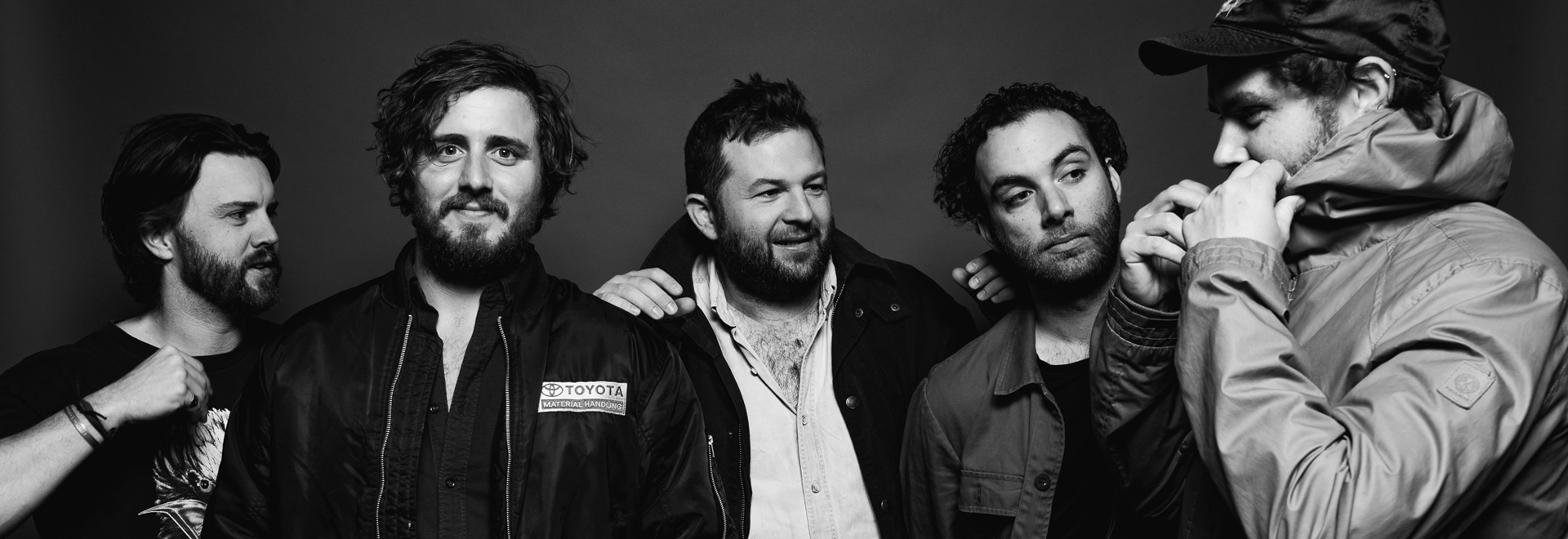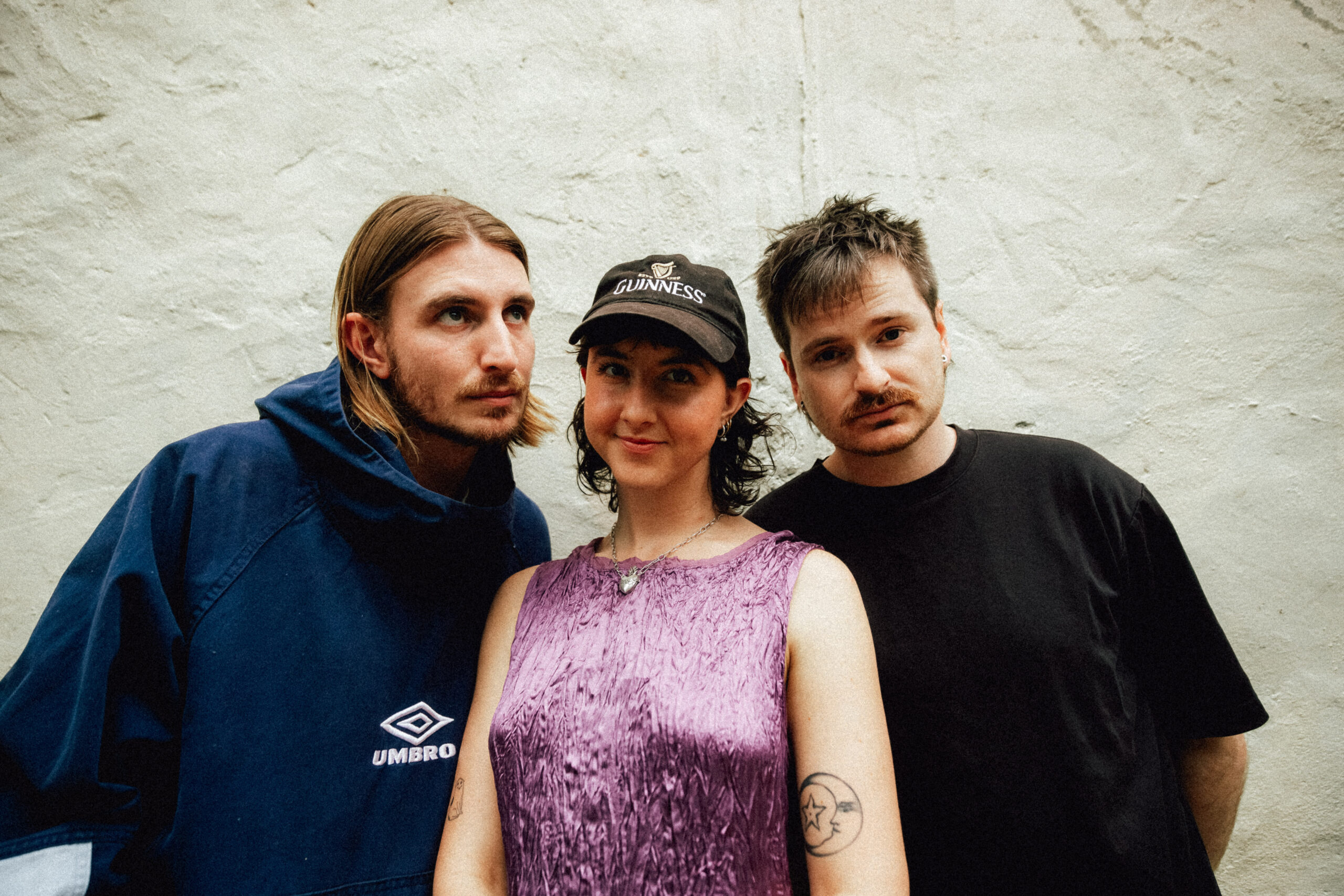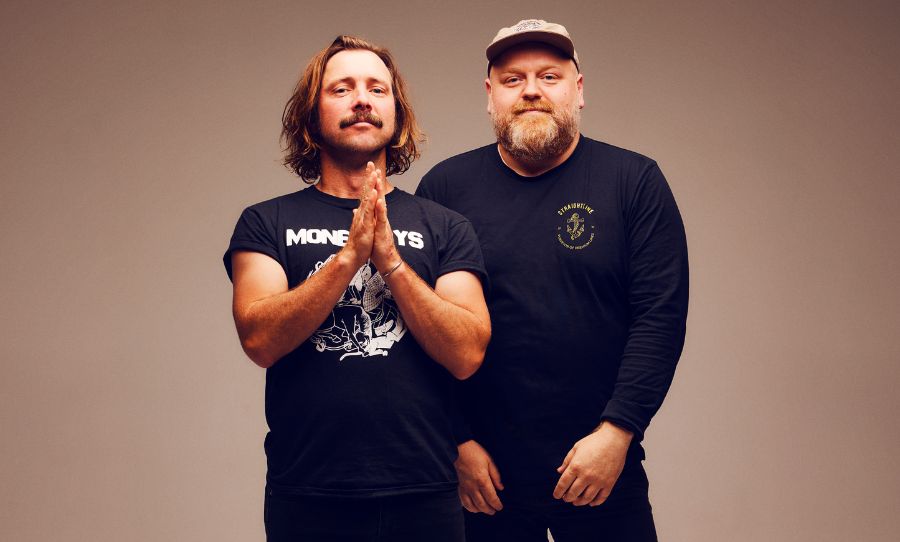Bad//Dreems are legends whose songs spin a riotous, politicised blend of punk and Australian folklore. From dispossession to dildo’s, the Adelaide five-piece aren’t afraid of anything or anyone when it comes to their music.
We caught up with the boys to chat the re-release of their seminal EP Badlands, their collaborations, and what’s in store.
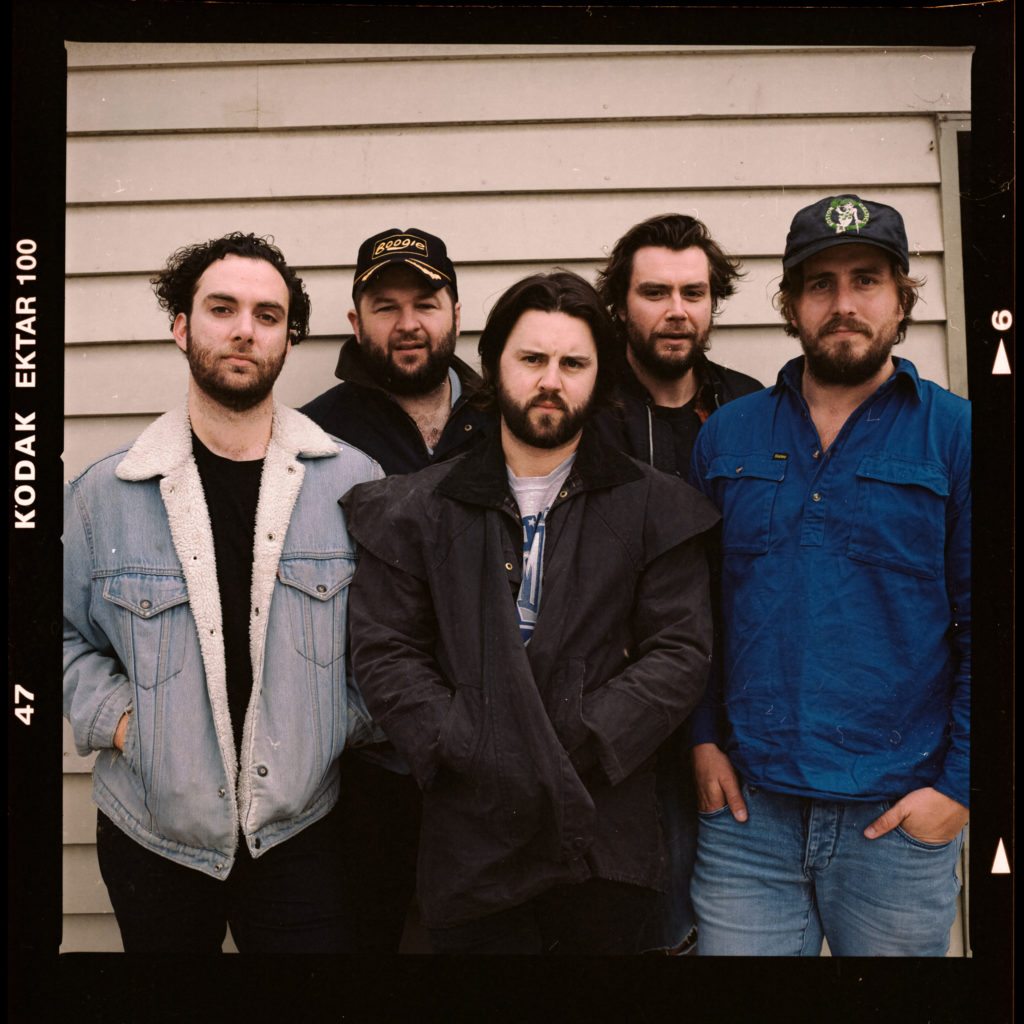
HAPPY: You’re re-releasing Bad Lands on the 26th of September for Record Store Day. Can you tell me a little bit about why you’re re-releasing?
BEN: Well, we never released it on vinyl and the only hard copies that exist are the CDs that we released when we released it. So, we’ve been wanting to do it for years because people always ask if they can get one, but then we never have them printed. So that’s kind of why we’re going with it and I’m pretty happy about it actually. I’ve just got one here, that’s the CD, it’s all fucking dirty and stuff. It’s the only copy I have and that’ll come out on vinyl.
HAPPY: This isn’t the one you recorded with Johnny McKay from Children Collide?
BEN: Some of the songs, yeah. He produced Tomorrow Mountain and I reckon he produced As Close to God as well, but that’s not on there. That’s just a standalone single. I think he might have helped us with Chills. We did some songs with him and do you know a guy called Jack Farley?
HAPPY: Yeah, I’ve heard of him.
BEN: He did all the Twerp stuff and Scott and Charlene’s Wedding in those early Melbourne days. That was a drawcard for us to use him, because we were trying to get that jangle, shit sound. I mean that in the best way possible, because it sounds awesome to me.
HAPPY: Hey Alex, how are you?
ALEX: Good thanks. Sorry, I’m late.
HAPPY: We’ve just been chatting about Badlands and Johnny from Children Collide and how you’re releasing it for vinyl on Record Store Day.
ALEX: I was just talking to Johnny yesterday actually. He’s in Sydney.
HAPPY: He is, he’s been hanging out in this room with me actually, weirdly enough. I had a listen to his record just recently, the new one… it’s great.
ALEX: Yeah, I really like it. I think it’s one of their best ones.
HAPPY: You’re also working on the Farmer and the Owl compilation as well and doing a cover of My Pal by God? Is that right?
BEN: Yeah, we actually did that ages ago.
ALEX: Just for Amazon Music. Amazon Music seemed to have a shortlist and they gave different bands some money to cover different Australian songs and we just did that one. Then we gave it to Farmer and the Owl to use on their compilation.
BEN: We couldn’t use it for a little while. No one knew what was going on with it and then…
ALEX: Amazon paid for it to use on their streaming service, but then that died I think.
BEN: Now everyone will be able to hear it.
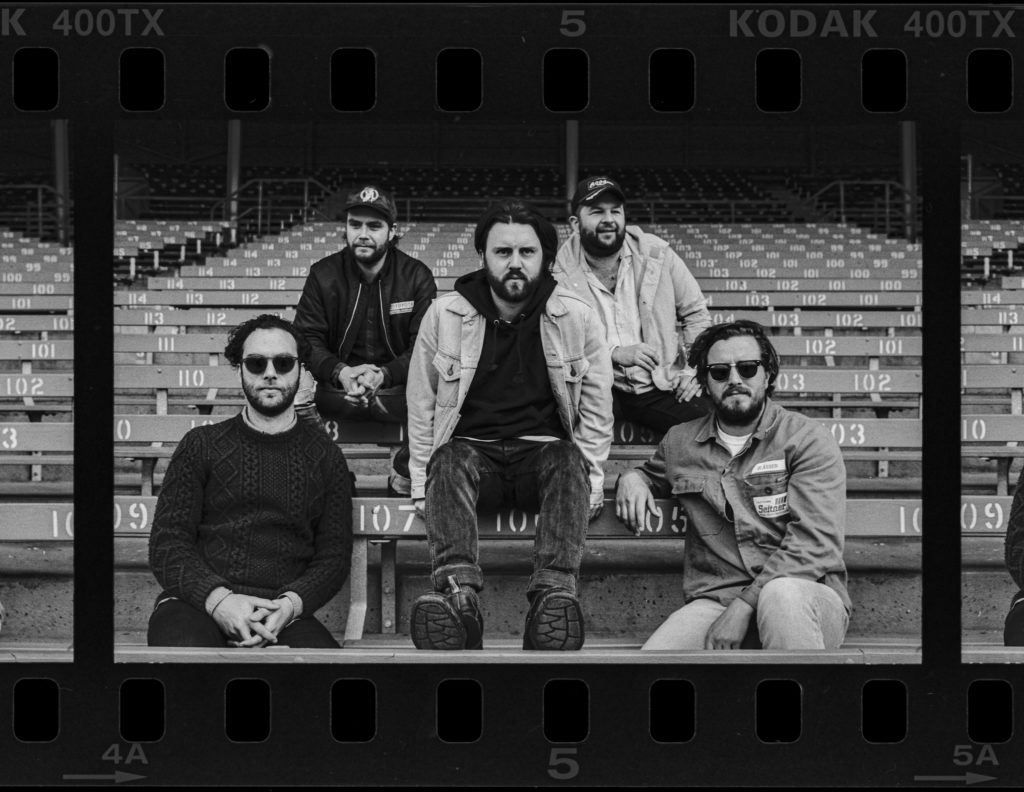
HAPPY: I guess the big thing is you guys have actually been locked away, but you’ve been doing tons of collaborations, I’ve been told. Your social media is full of collaborations of late, can you tell me a bit about that?
BEN: With the Sunday Songbook and stuff? Alex, you can take that one…
ALEX: Ben started doing the Sunday Songbook from his place in Adelaide, which was just him playing our songs and covers, we thought it was really nice and awesome. Then one weekend he couldn’t do it. It just so happened that Paddy Harrowsmith was staying at my house at the time, from Green Buzzard and various other bands, so I just recorded him doing Helpless. Then a few other people that had just been coming through town or staying with me, Alex Gow did one and he did My Only Friend, I played the discord and violin. Jack Parsons from the Pre-Littles, he did one as well. There’s a few more in the pipeline but it’s hard to get people round.
BEN: And nobody comes to Adelaide or stays at my house, so Alex is the only one that can do them.
HAPPY: With Dessert Television, it felt like you’d changed tack a little bit and there’s a bit more of a post-punk, UK vibe going on. Can you tell me a bit about that?
ALEX: I guess it was a changed tack and also a full circle. It was not really a very considered change of tack, but we had some songs that we’d been working on and then we happened to be in the UK and there was a week between this huge show that DMA’s did at Brixton Academy. We had a week of time free and then Dan, our Manager, suggested we record with Rory Atwell, who he’d had something to do with before. He used to play in Test Icicles and I think he played bass in Die! Die! Die!. He’s basically been an engineer/producer for last 15 years. So, he just had a bit of time to kill, so we went into a rehearsal room in Brighton and worked on a few songs and then we recorded those over a couple of days in his little shoebox studio in Hackney. Dessert Television was one of those songs. They were really only planned to be demo’s, but that one we were happy enough given the state of everything. We may as well chuck it out. It was just a really awesome recording experience because we just gelled with him. We were on the same page, musically, without having to say anything at all. I can remember we were playing that song through and usually, when you’re recording, you play it through and you go in, and they haven’t even started. They’re still fucking around with some engineering type thing. I remember when we were doing that session, we went in, we played it through a couple of times and he already had it up and sounding exactly as we envisaged. He’s real quick on his soft synths. Everything just seemed to gel with working with him and we’re looking forward to doing more recording with him in any way we can.
HAPPY: Just on the topic of collaborations, I saw you just recently do a performance with Peter Garrett as well.
BEN: The Triple J thing?
HAPPY: Yeah, how did that all come about?
ALEX: We had the opportunity to do Like a Version and that song was one that we were fond of and wanted to do. It was important to have the right personnel to do that song, given its subject matter. The first people to be involved with it were Mumbali, who were the guys from Groote Island. We’d met them briefly at Big Sound, because they were filming a little live session for us. They were really keen on doing it, then we just reached out to Peter Garrett through, because we’ve played with Midnight Oil three times. Once in Australia and twice in the UK, and he happened to be in the studio recording the stuff they’re releasing now… I guess and he was keen, which we were pretty honoured and excited about, and we rehearsed with him and then Emily Wurramara got on board. We rehearsed with Emily and the Mumbali guys the day before and then Peter just rocked up to the studio and smashed it one take basically.
BEN: Pete, do you want to come to rehearsals? No thanks mate, I’m good. It was literally like that.
ALEX: But it was quite fascinating, his level of musicianship. He came in and his voice and just the way he delivered the verse, it was quite surreal being in a room with a voice that iconic and seeing it actually delivered live. That was one thing I really remembered about it. That whole thing was one of my best experiences in music. Doing that song and hanging out with the guys from Mumbali, because they stayed down in Sydney for three or four days and we got to talk to them quite a lot. Learning about their culture and one of the big parts of their band is being ambassadors for their culture. Yornu culture and the culture of Groote Island. The verse that they delivered in that cover and most of their songs, I was amazed to learn that they’re basically melodies that have been passed down through generations. They estimated the melody and the words they used in that cover are probably thousands of years old, which fits in. When you hear it, it’s this spine-chilling timeless thing, and it makes a lot of sense when you hear. It does sound like something from another world and another era.
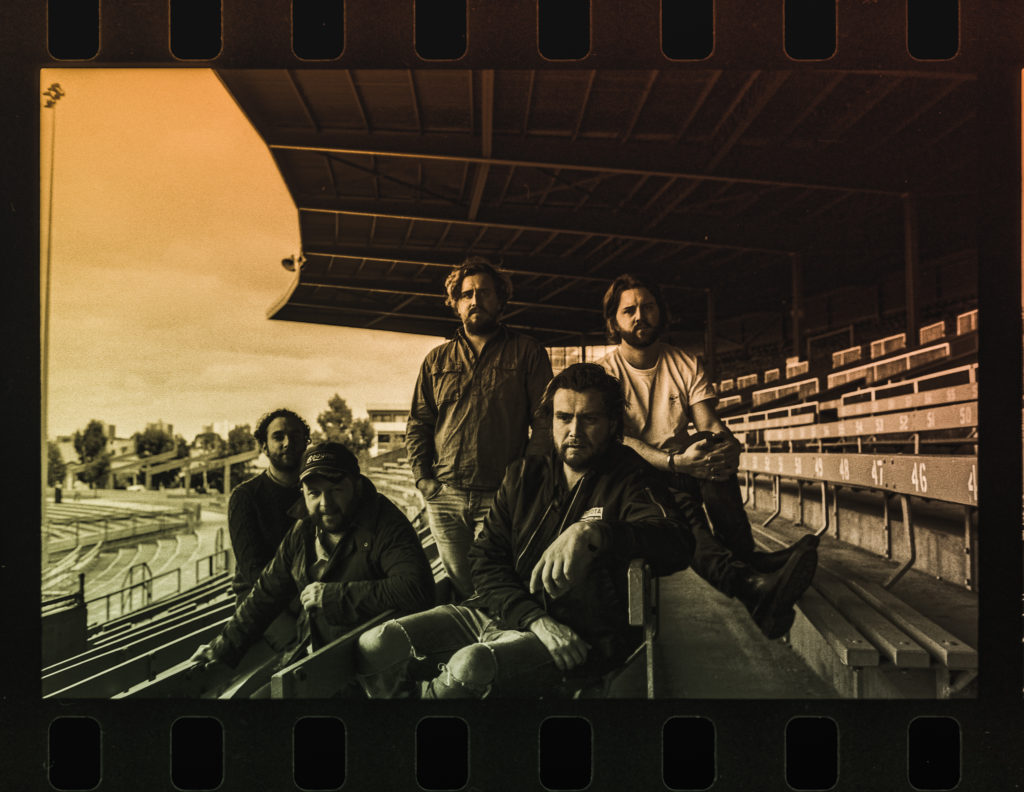
HAPPY: That’s amazing to think that a melody could carry for that time.
ALEX: Yeah. One of the things that’s interesting about their home, or Groote Island is that it had contact with white people before colonisation, because the Dutch used to trade there and even before that the Maccasans from Indonesia and also the Japanese. They had been dealing with outsiders for ages and one of the other songs they have is about a man standing on the beach and seeing the sailing ships for the first time. That’s literally handed down, generation to generation. It’s quite fascinating to think. Now they’re delivering this music with those traditional melodies and putting it with guitar and stuff as well. They’re pretty amazing, to be able to work with them and hear about that.
HAPPY: Hopefully, as time moves on and as all of these collaborations come together and inform what the release that’s coming for you is, there’ll be scope for you to revisit those things. With all of these things that have happened to you, in quite quick succession you’ve had all of these quite incredible collaborations. How have they informed what’s coming next for Bad//Dreems? I’m assuming they’ve left their mark on you?
BEN: For me, it feels like it’s been a nice way to close a certain chapter of the style of music we were writing. We’ve got three albums that are of a similar ilk and sound, and you’re going for something specific. All the stuff that happened around Doomsday Ballet was a nice way to put a pin in that one and step sideways. Like what Alex was saying before, going full circle. Trying to capture some of the sounds and the feeling and the vibe of what we were going for early, when it was a bit more no-frills and you had less direction. I think we sort of focused for a long time on trying to develop our song writing craft and skills and lyricism. Now we’re going to try and maybe move to that post-punk, jagged musicality we were trying to capture early on. That most people have probably never heard because we never recorded it. By the time we were recording the EP, we’d moved into that jangle world of songwriting. That’s what it sort of means for me.
HAPPY: That’s really cool and it’s really cool to be able to revisit where you started as well.
BEN: It has almost been a decade, so it’s not a short period of time. Alex and I have been writing songs since, it dates back in emails to 2010. We’ve been going for a while.
ALEX: One of the things about the collaboration that came, it was all just organic really. That’s how a lot of stuff with us, the things where you just follow your instinct and you meet people. One of the best things about music and being in a band for us, is the chance to be part of a community. When we started in Adelaide, there wasn’t really much of a community that we were part of. But, by virtue of being able to play shows around the country and then do stuff like this, we’ve got so many close friends through all. Not only bands, but producers, artists, creatives, videographers. In the same way, you start playing in a band because that adds something more to what you can just do recording or playing by yourself, it’s the same way. It’s great to be able to work with Mumbali or a certain person making videos, or a certain person making art. It’s just more through the friendship and the connection to start with and then if that’s strong, usually what ends up coming out of it is strong. Even with a football team, it’s just happened that I’d been up there and had formed a connection with that. It was, “that’ll be a cool thing to do, to have some connection with the band.” Tied into what Ben was saying, I guess sometimes, in songwriting, and the way that you record, you can try and set plans or restrictions on what you do. I think that we did do that at a certain stage with our recording. The first three albums make it fairly stripped back guitar music. Basically, a representation of how a guitar band sounds live and now, we’re removing some of those restrictions and following our noses a bit more, just exploring parts that we had maybe touched on before but haven’t really explored.
Intro by Brendan Neville
